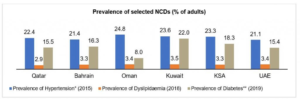Authored by: Humza Rana
No communicable diseases (NCDs), commonly referred to as chronic illnesses, typically have an extended duration and arise from a combination of genetic, physiological, environmental, and lifestyle factors. The primary categories of NCDs include cardiovascular disorders (such as heart attacks and strokes), cancers, chronic respiratory conditions (like chronic obstructive pulmonary disease and asthma), and diabetes. NCDs disproportionately impact individuals in lower- and middle-income nations, where approximately three-quarters of global NCD fatalities (32 million) occur. Non-communicable diseases (NCDs), including diabetes, cardiovascular diseases, cancer, and chronic respiratory illnesses, pose a growing challenge to public health in the Gulf Cooperation Council (GCC) region. Despite remarkable strides in healthcare infrastructure, these chronic illnesses account for a significant share of morbidity and mortality, straining healthcare systems and impacting the region’s socioeconomic development.
Individuals at risk
Individuals across every age range, region, and nation are impacted by NCDs. While these ailments are frequently linked to older demographics, nearly 18 million deaths from NCDs occur prior to reaching the age of 70. In fact, NCDs result in more fatalities among this age group than all other causes combined. It is estimated that 82% of these untimely deaths happen in low- and middle-income nations.
Children, adults, and seniors are all susceptible to the risk factors that lead to NCDs, whether due to poor nutrition, lack of physical activity, exposure to tobacco smoke, or the detrimental consumption of alcohol or air pollution.
Poor nutrition and insufficient physical activity may manifest in individuals as heightened blood pressure, increased blood glucose levels, raised blood lipids, and obesity. These conditions are termed metabolic risk factors and can result in cardiovascular disease, the foremost NCD in terms of premature fatalities.
Risk elements
Behavioral risk elements
Behavioral risk elements heighten the likelihood of NCDs, such as:
- use of tobacco (along with the repercussions of second-hand smoke exposure);
- unhealthy eating habits, which include excessive salt, sugar, and fats;
- excessive consumption of alcohol; and
- lack of sufficient physical exercise.
The social, commercial, and physical surroundings significantly influence these behaviors.
Metabolic risk elements
Behavioral risk elements lead to four primary metabolic alterations that heighten the probability of NCDs:
- elevated blood pressure (including hypertension);
- being overweight/obese;
- high blood sugar levels (which encompass diabetes); and
- unusual blood lipids (including elevated cholesterol).
When considering attributable fatalities, the foremost metabolic risk element worldwide is raised blood pressure (which accounts for 25% of global NCD-related deaths), followed by elevated blood sugar and weight issues.
Environmental risk elements
Multiple environmental risk elements contribute to NCDs. Air pollution – both indoors and outdoors – stands out as the most significant, responsible for 6.7 million deaths worldwide, of which roughly 5.6 million are linked to NCDs, including stroke, ischemic heart disease, chronic obstructive pulmonary disease, and lung cancer.
Prevention and Management
A crucial strategy for addressing NCDs is to target the mitigation of risk factors linked to these illnesses. Affordable solutions are available for governments and other stakeholders to tackle prevalent modifiable risk factors.
Keeping track of progress and trends related to NCDs and their risk factors is vital for shaping policy and setting priorities. To diminish the repercussions of NCDs on individuals and communities, a holistic approach is essential, necessitating collaboration across all sectors, including healthcare, finance, transportation, education, agriculture, urban planning, and beyond, to minimize the risks tied to NCDs and to advocate for preventive and control measures.
Investing in enhanced management of NCDs is fundamental. The management of NCDs encompasses the identification, screening, and treatment of these conditions, along with providing palliative care for those in need. High impact essential NCD interventions can be provided through a primary healthcare framework to bolster early identification and prompt treatment.
Evidence indicates that such interventions represent excellent economic investments, as early provision to patients can reduce the need for costlier treatments. Countries with insufficient healthcare coverage are unlikely to offer universal access to essential NCD interventions. NCD management interventions are critical for attaining the SDG target regarding NCDs.

UNICEF’s initiative
UNICEF collaborates with governments and partners to mitigate the risk factors linked to non-communicable diseases (NCDs) while enhancing health systems to identify and manage NCDs among children and youth.
We aim to weave prevention and management of childhood NCDs into our maternal, newborn, and child health initiatives. As a participant in the United Nations Interagency Task Force on NCDs, we work collectively with other UN agencies to assist governments and partners in implementing multi-sectoral strategies to combat NCDs.
Our efforts concerning non-communicable diseases reach beyond healthcare. We also provide support for NCD prevention initiatives in domains such as education—especially through school-based programs—and nutrition.
UNICEF champions initiatives for NCD prevention and control, enhances the capacity of health systems to address childhood NCDs, influences national NCD policy, and empowers communities to cultivate demand and establish public accountability.
The Path Forward
Combatting NCDs in the GCC necessitates a comprehensive strategy that includes community involvement, legislative change, and technological advancements.
By focusing on early diagnosis, prevention, and interdisciplinary collaboration, the region can lessen the effects of non-communicable diseases, ensuring a healthier future for its inhabitants.
With persistent initiatives, the GCC is set to become a pioneer in the struggle against NCDs, providing a model for other areas confronting similar obstacles.
Sources
